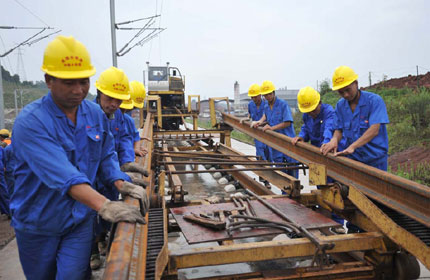Rectifications needed, not excuses
Updated: 2014-07-04 08:40
(China Daily)
|
|||||||||||
At a recent State Council meeting, Premier Li Keqiang urged the State departments concerned to carefully rectify the problems exposed by the auditing authorities and report the actions taken to the State Council by the end of October; they will also be made public. Such a definite deadline is expected to prompt the departments to address the issue seriously and take practical measures to rectify the problems exposed during their audits, a Beijing News editorial said.
Following the publication of the annual audit report by the National Audit Office in previous years, some State departments failed to offer to the public the expected information on how they were addressing the issues raised by the audit. Some even made an unsatisfactory response to the report, such as going all out to defend rather than rectify the problems mentioned.
Following the publication of a recent audit report in which the audit authorities said that the China Medical Association had acquired from pharmaceutical enterprises 820 million yuan ($132 million) in endorsement fees in the preceding two years, an official from an institution under the National Health and Family Planning Commission even claimed the collection of the fees was a practice learned from the United States, an argument that was rightfully scorned for being more of a defense rather than an apology for malpractices or a vow to rectify the practice.
This is not an isolated case. Following this year's audit, which said the country's social security fund suffered a total loss of 6.953 billion yuan in terms of its self-operating investment from 2010 to 2013, causing widespread public concern over the safety of the enormous fund closely related to people's pensions, the national council for the fund argued that the loss is related to the fall in the country capital market and that the investment project has gained 10.794 billion yuan in returns since 2005.
While the relevant departments can offer their explanations as to how the problems mentioned by the audit authorities have arisen, they should do so in a more candid and pertinent manner, admitting if management factors were responsible for the loss and how they will prevent investment risks in the future.
What the public anticipates most following the annual auditing furor is how the exposed problems will be rectified or resolved, rather than some vague explanations or defensive denials from the departments concerned.
(China Daily 07/04/2014 page8)
Related Stories
SEC rethinking auditing penalties, lawyers say 2014-06-04 06:58
Auditing storm should promote system reform 2013-08-30 22:59
Chinese premier stresses public fund auditing 2014-01-09 21:08
Today's Top News
Gambling costs World Cup fans their lives
US supports Ukraine's decision to suspend ceasefire
It's all about making a spectacle
China likely to see 7.5% growth in second quarter
Palace Museum feeling the squeeze of visitors
Myanmar pagoda replica given to China
US sends 300 more troops to Iraq over concerns
Hong Kong at the crossroads
Hot Topics
Lunar probe , China growth forecasts, Emission rules get tougher, China seen through 'colored lens', International board,
Editor's Picks

|

|

|

|

|

|





